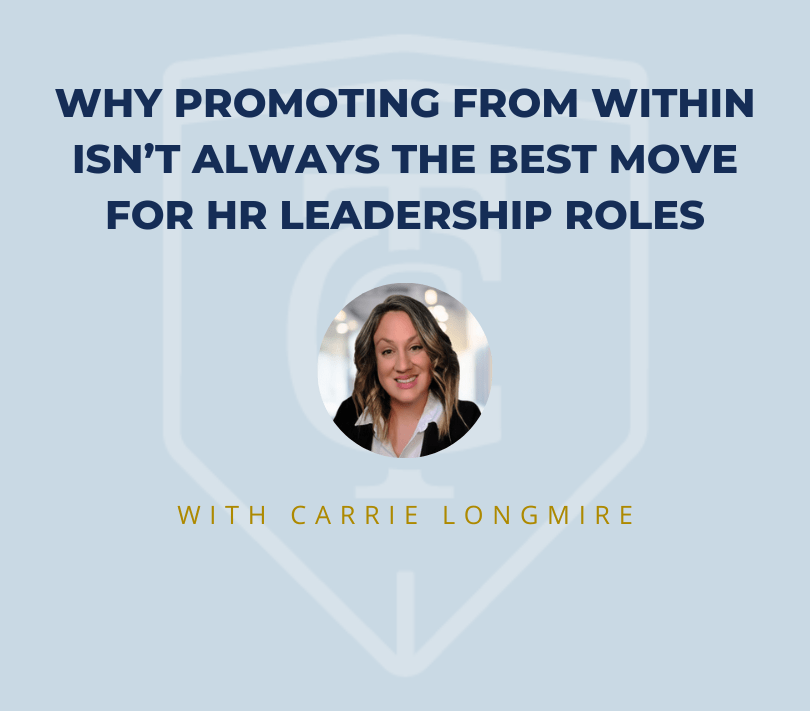
As an executive recruiter specializing in Human Resources leadership, I’m a big believer in internal mobility and talent development. But when it comes to senior HR roles — especially those that sit at the intersection of strategy, people, and culture — promoting from within isn’t always the best move.
I’ve seen too many organizations struggle after elevating someone who was great in their previous role but isn’t fully prepared to lead the entire HR function. And in today’s business environment, where HR is expected to act as both a strategic partner and a culture builder, making the right leadership decision is critical.
Here’s why internal promotion for HR leadership can sometimes backfire — and what to consider before making that call.
- The Scope Has Changed — Drastically
The HR leader of today is not just managing payroll, compliance, and employee relations. They’re shaping organizational design, embedding DEI strategy, leading workforce transformation, and sitting at the table with the CEO and CFO.
Someone who’s grown within your company may understand the culture, but they may not have the external exposure or strategic muscle required for a role that’s increasingly complex and cross-functional.
- Institutional Blind Spots Can Hurt Transformation
Promoting someone who’s “grown up” in the organization can bring continuity — but it can also entrench the status quo. Many companies today are looking to transform their HR function, whether it’s due to growth, M&A, or post-pandemic recalibration.
Leaders who’ve only known one way of doing things may lack the objectivity or boldness to challenge outdated processes and rebuild with a fresh perspective.
- Respect vs. Readiness: The Risk of “Nice Guy” Promotions
One of the biggest mistakes I see is promoting someone into an HR leadership role because they’re well-liked, loyal, or “due for a promotion.” It’s a classic case of good intentions gone wrong.
Leadership requires influence, resilience, and the ability to drive change — even when it’s unpopular. Being a steady hand in a manager role doesn’t always translate to executive leadership.
- You May Be Missing Out on Game-Changing Talent
When you only look inside, you don’t know what you’re missing outside.
There’s a deep bench of HR talent in the market — leaders who have built functions from scratch, scaled rapidly growing teams, and navigated complex employee relations in global environments. They can bring best practices and innovative ideas from other industries, geographies, and challenges.
Bringing in an outside leader doesn’t just fill a role — it can elevate your entire people strategy.
- Internal Promotion Doesn’t Mean Never Hiring Externally
This isn’t a binary decision. Promoting from within can work — if paired with the right support, mentorship, and sometimes, external advisors or fractional help.
But when the business is evolving, expectations are high, and the stakes are real, external search may be your best bet to find the right HR leader — not just the most familiar one.
The HR function is too important to get wrong. While promoting from within can work beautifully in certain situations, companies need to take a clear-eyed look at what the business needs today — and tomorrow.
As an executive recruiter, I help organizations assess their current bench, understand where the gaps are, and determine whether the next great HR leader is already in the building — or if it’s time to open the door to new possibilities. So let’s talk. If you’re navigating an HR leadership change or thinking about your next hire, I’d be happy to have a confidential conversation.

As a servant minded and seasoned Human Resources professional with over 15 years of experience in all aspects of Human Resources, Carrie is a dedicated to and passionate about helping others achieve their professional goals. She understands the importance of a fulfilling career and how it greatly impacts one’s overall well-being and happiness.
Carrie takes the time to truly understand the needs and desires of those she works with, going beyond simply placing them in a job, but rather assisting them in achieving fulfillment in all aspects of their lives through the development and enhancement of their career. Her approach is service focused, personal, and “high touch.” She takes the time to build strong rapport with each individual to ensure the best possible career match. Continue reading about Carrie on her bio page.

